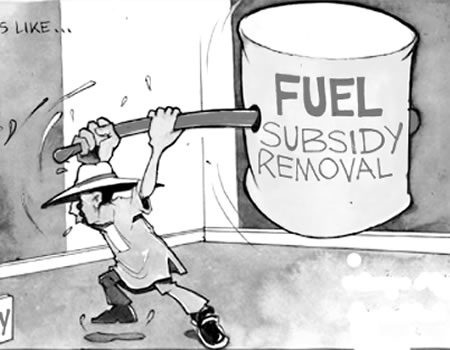The vice presidential candidates of the political parties who participated in Friday’s debate ahead of the 2019 elections, except that of the All Progressives Congress (APC), unanimously called for the removal of oil subsidy regime, describing it as a fraud.
Sure ways to maintain your natural hair
While Vice President Yemi Osinbajo agreed that subsidy was not particularly bad, Dr Peter Obi (Peoples Democratic Party), Khedijah Abdullahi-Iya (Alliance for New Nigeria), Ganiyu Galadima (Allied Congress Party of Nigeria) and Umma Getso (Young Progressives Party (YPP) all called for a total removal of the subsidy regime.
The APC vice presidential candidate, while admitting that there were inherent abuses in the subsidy regime, said a total removal of the regime would lead to an increase in the pump price of Petroleum Motor Spirit (PMS), otherwise known as petrol, from N145 to N220 per litre.
The vice president said countries in all parts of the world have various forms of subsidy regime and advised that the regime should be tolerated for a while as a total removal would lead to a further increase in the cost of living.
However, the PDP vice presidential candidate, Dr Obi, disagreed with Osinbajo as he declared that the government was only subsidising inefficiency, adding that doing the right thing in the oil sector would eventually lead to a fall in the price of petroleum products, especially PMS.
Also speaking in favour of removal of subsidy, the vice presidential candidate of ACPN, Galadima, said the country should do away with subsidy as “it has not improved efficiency. What they are doing is round tripping. They are killing the economy and Nigerians. Subsidy is not in the interest of the poor, but is only meant for the rich”
Umma Getso of YPP simply said subsidy should be removed because, “subsidy, to a typical Nigerian, is a scam”, while Abdullahi-Iya of ANN said “subsidy is fraught with corruption. If transparency is applied, the excesses accruing from subsidy can be allocated to the other critical sectors, including education, health and for a complete overhauling of the Civil Service.”
The five presidential candidates however unanimously agreed that the Nigerian government should withhold appending its signature to the African Continental Free Trade Agreement until all parts of the agreement were critically looked into to ensure maximal advantages to the country.
Obi emphasised the need to look into the agreement properly as the country stood to benefit more, being the biggest economy in the African Continent, even as Vice President Osinbajo said all the loopholes in the agreement were being carefully looked into, with a view to reach a consensus with all the critical sectors in the economy, including MAN and NACCIMA.
Similarly, the ANN vice presidential candidate, Abdullahi-Iya, called for a look into all parts of the agreement to determine how signing it would positively affect the people and also encourage local manufacturing.
Galadima of the ACPN said the agreement would not be in the interest of the country as it would turn Nigeria into a dumping ground, adding that “the proper thing to do is to put signing it on hold till the national economy improves.”
The five presidential candidates also debated on concessioning of critical sectors of the economy, including the refineries and aviation, foreign policy, multiple taxation, ICT and technological development, ease of doing business in the country, the moribund Ajaokuta Steel Complex and the ongoing collaboration between Nigeria, Chad, Cameroon and Niger Republic in the fight against the Boko Haram insurgency, among other critical issues.






